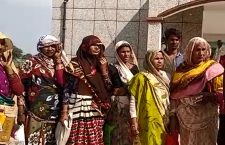On February 14, more than 40 Indian CRPF personnel were killed in a suicide attack by the Pakistan-based terrorist outfit Jaish-e-Mohammad in Pulwama, which lies in India-administered Kashmir. 11 of the martyred jawans were from Uttar Pradesh, and one was from the village of Taufapur in Varanasi. His name was Ramesh Yadav and he had returned to the army headquarters in Pulwana only two days ago after his holiday. After the news of his sacrifice became public, scores of people from the village and its surroundings gathered around Yadav’s house. Everyone from school students to the elderly were seen marching and shouting slogans of the “amar (immortal)” Ramesh Yadav and the downfall of Pakistan.
“My son sacrificed his life for this country. I have lost one son, but I have another. I would generously offer my second son to protect this nation,” said Shyam Narayan, the father of the martyred CRPF officer, “I want the government to offer us a monetary or in-kind compensation, because how else will we survive?” Wrapped up in a shawl, he spoke softly but firmly, stating that they were expecting a compensation of Rs. 1.5 crores. He also added that the family would not perform Yadav’s last rites until the state’s Chief Minister paid them a personal visit and offered condolences. “I am old, but I have to take care of one grandson, two daughters in law and one brother. We have kept aside the property we own to safeguard our future, like for our grandson’s education. I am old, where will I go to work at this age?” he asked in the same quiet tone.
The state government announced a compensation of Rs 25 lakhs to each of the families–nowhere close to what Narayan demanded. But the Yogi Adityanath government has announced a job to one member of each soldier’s family as a part of the compensation, which Narayan was in favour of. “I have a daughter-in-law. We helped her complete her B.A.,” he said about Yadav’s wife, “The government should offer her a job in Varanasi or wherever she is eligible. I offer my only son left now for the nation as well.”
Renu, the martyr’s wife, was all anger in sharp contrast to her father in law’s demeanour. “We demand that the government offer a job not only to me but to my son as well. We will both work.” But unlike Narayan, she had no interest in associating with the armed forces: “I refuse to do an army-related job. And my son will never join the army.” She also demanded that Prime Minister Narendra Modi visit the families of all the martyrs, “Yes, he should. It is all Modi’s fault.” She added by way of explanation, “He is not ruling the nation properly. It is only because of him that I have lost my husband.”
Data released by the Ministry of Home Affairs showed there has been a sharp rise in terror activities between 2014 and 2018, with a 176% jump in terror attacks in the Valley in the same time period. The Pulwana attack has been recognized as the deadliest on in the Valley in the last three decades of Kashmir’s insurgency.
“The government needs to act effectively in this matter and counter-attack immediately,” said Narayan matter-of-factly, “Counter-attacking is the only way to ensure that no terrorist will enter Indian territory again and we will not be in a position to lose another brave heart.”
Narayan is also one of the many in the rising tide of people–politicians, entertainment stars and ordinary citizens alike– calling for retaliation. People have been taking to the streets in anything but peaceful marches, raising slogans calling for revenge against Pakistan. Social media has been flooded with war cries. PM Modi himself not only condemned the attack on CRPF personnel but also gave security forces full freedom to retaliate against the heinous attack that killed 40 paramilitary troopers.
Ram Kishan Yadav, an ex-district head of Chandauli, justified the response not in the eye for an eye mood, but what he deemed as entirely reasonable: “Terrorists are never stopped by words and discussions. We must speak in their language.” He added, reflecting the mood that has since been prevalent in some parts of Uttar Pradesh that are akin to war cries, “The whole nation is grief-stricken. It is not just their families’ loss, it is the whole nation’s. To ensure that this sacrifice was not in vain, the government needs to act accordingly. It is time for the government to make a big move and finish this once and for all.” According to him, “Words are not enough for a loss of this magnitude.”
As for what the government could do in this situation, he said, “The government must lend help in any way they can. We can see the plight of a farmer whose son has been sacrificed for this nation.”
Since the attack, the Indian government has responded with an encounter, in which three members of the Jaish outfit and an Army major were killed.
This Khabar Lahariya article first appeared on Firstpost.

